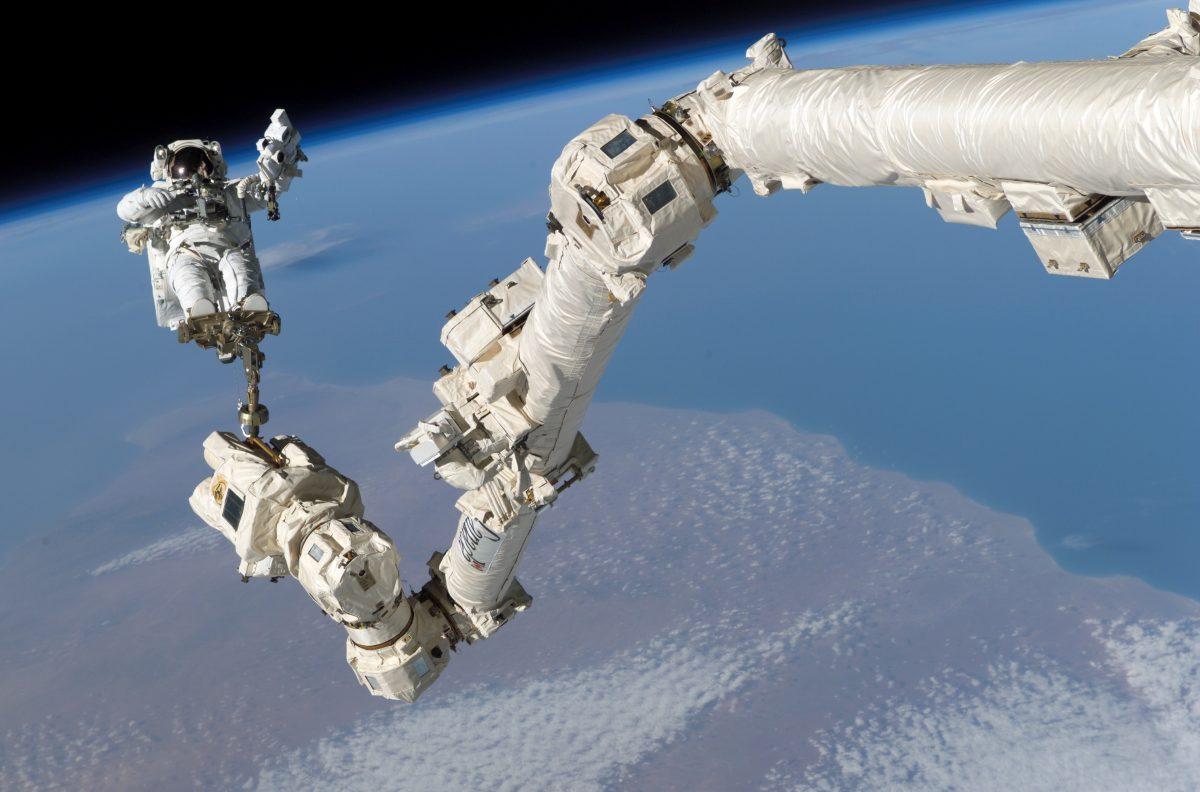 Steven Robinson, attached to the ISS, working in outer space on NASA STS-114 mission
Steven Robinson, attached to the ISS, working in outer space on NASA STS-114 missionWe all dreamed of becoming someone at a young age. But how many people have grown and really fulfilled their childhood dreams? Millions of people want to go into space, but there were only a few thousand. Children often dream of becoming scientists or doctors, but few become them. What advice can be given to a teenager who wants to become an astronaut or an astrophysicist? Today our reader asked this question:
I hope when I grow up to become an astronaut or an astrophysicist. And I thought that it would be nice to ask a real astrophysicist what this career means in reality. And although in general I dream of becoming an astronaut, I heard that this career does not imply full employment, and if I have to combine it with something else, I probably would prefer astrophysics. I would like to know what you know about astronauts and various astrophysicists, or if there are any other classes that you could recommend to a teenager who is interested in exploration and adventure!
A very broad question - let's start by examining yourself.
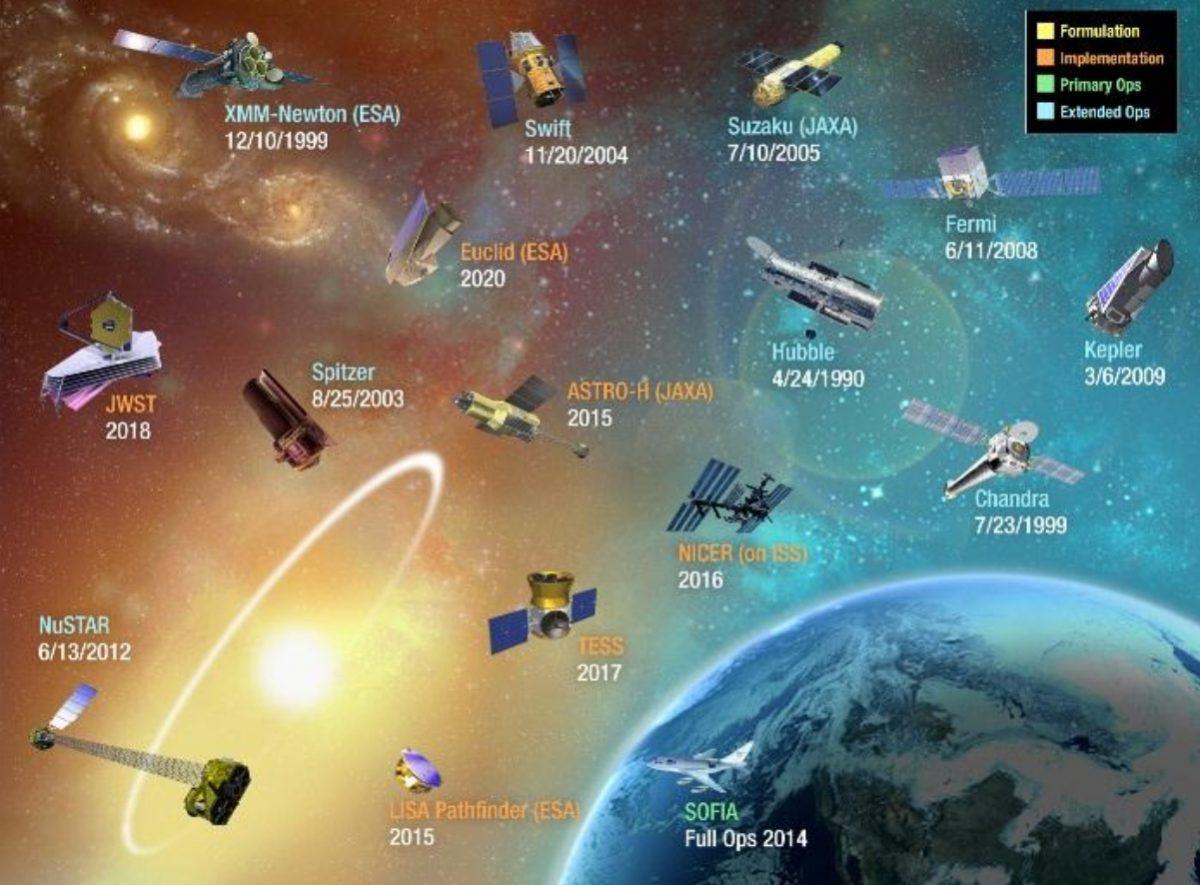 Current and future scientific space missions
Current and future scientific space missionsIn high school, you should already know the following about yourself:
• your strengths,
• What are you interested in,
• What motivates you?
• What seems like the perfect dream to you
• What do you want to work actively,
• What skills would you like to improve?
• And what would you like to study for as long as possible.
And since you asked me a question, I will try to give good advice.
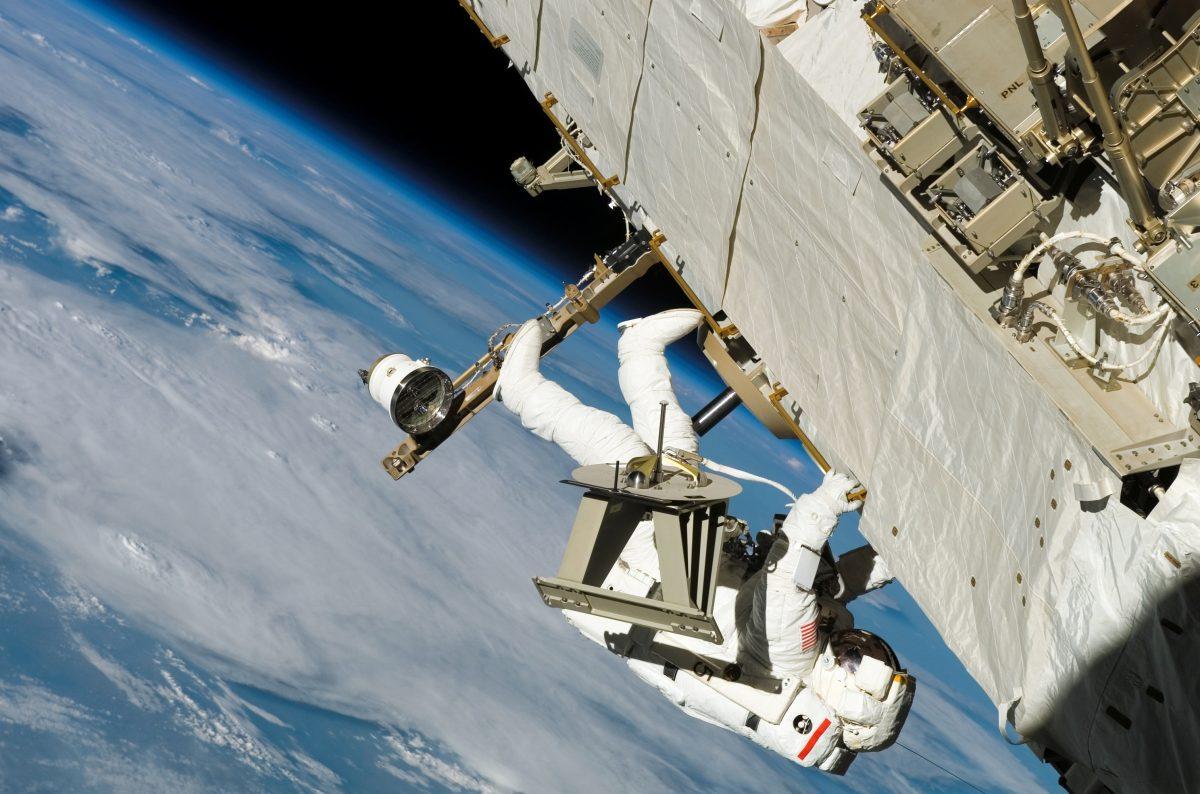 Pier Sellers, NASA STS-121 mission, moves to the ISS farm during the third spacewalk
Pier Sellers, NASA STS-121 mission, moves to the ISS farm during the third spacewalkIf your goals are space exploration and astrophysics, then in your case, you need to focus on developing the basic skills you need to do this kind of work well. The most important of them is in the area of problem solving, both alone and in groups. At school, we view problem solving as a separate lesson: a math problem is given, you need to sit down and solve it. Given the chemical equation, you need to find the reaction products. Given the essay, you need to analyze it, determine the meaning and purpose. You will need to enroll in the largest possible number of advanced courses and learn how to solve complex problems. Sign up for chemistry, biology, physics, geology, mathematics. Learn to program in at least one language. This will give you a big head start - but it will not give you the opportunity to achieve anything. Such skills are valuable, but they alone are not enough.
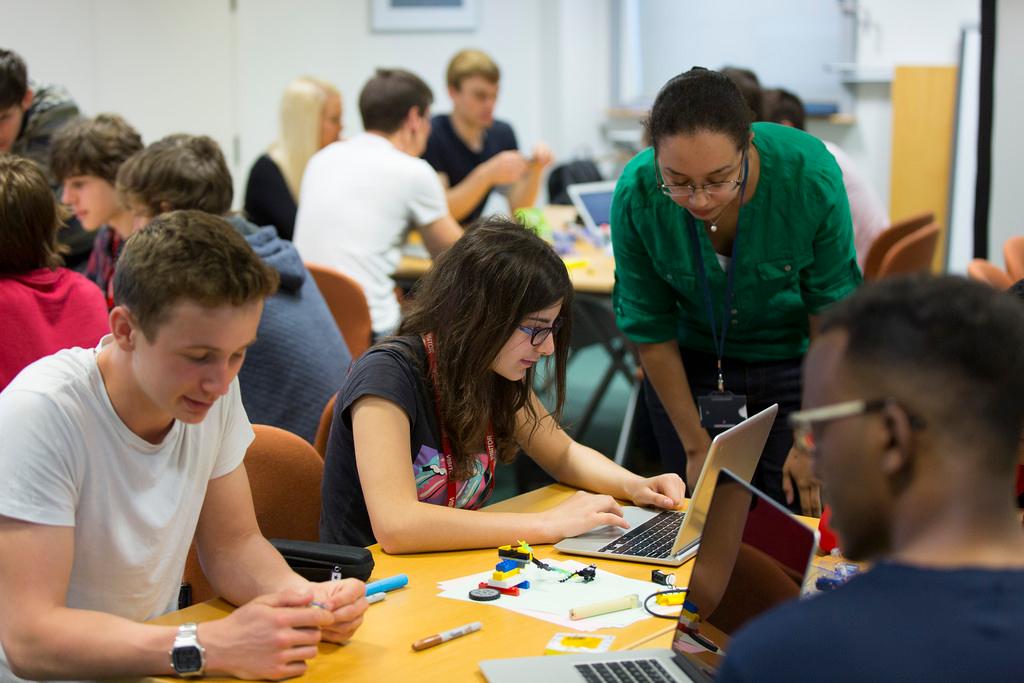 Programming is quickly becoming a necessary skill for students of the exact sciences.
Programming is quickly becoming a necessary skill for students of the exact sciences.They are not enough because future challenges you will face will be too difficult to solve yourself. Even if you find yourself the smartest person in the world, there will not be enough hours in the bottom for you to solve tasks on your own and in limited time. You need to learn how to work in a team. You need to learn how to solve small tasks that contribute to the overall business of the team, following the instructions of another person. You need to learn how to interact effectively, that is, how to listen and speak / write. And you need to demonstrate leadership in any range, from managing your own team to a situation where you need to aggressively but constructively criticize the leader leading the team in the wrong direction.
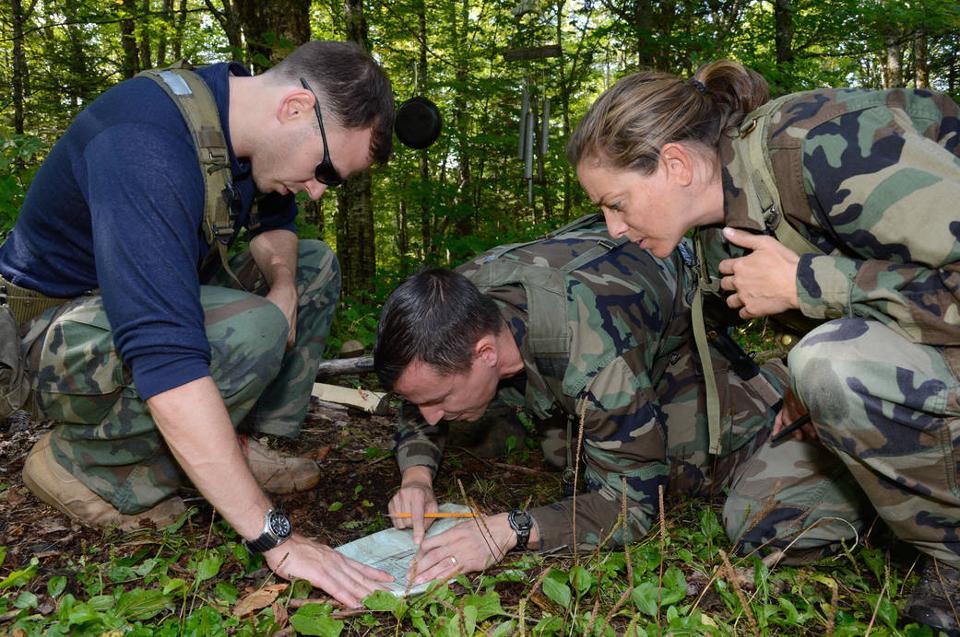 Teamwork is extremely important for future astronauts. Candidates for astronauts are considering a scheme that will help them live in the wild for three days.
Teamwork is extremely important for future astronauts. Candidates for astronauts are considering a scheme that will help them live in the wild for three days.Study history, study in-depth native language, and also learn a foreign language. Participate in group activities, even if it's just a party in a group of awkward, insecure teenagers (at 14, all of them are). When high school comes to an end, many paths will be open to you. And here the paths of astrophysics and astronaut diverge. Conscience them, as did Jeffrey Hoffman, Stan Love or John Grunsfeld, but these are just three people in the history of NASA, known to me. (Perhaps there are others, but such - no more than 0.1% of all astronauts). It's so difficult because nowadays you can become an astronaut in three ways: becoming a pilot, becoming a scientist / engineer / doctor, or becoming an extremely rich multimillionaire.
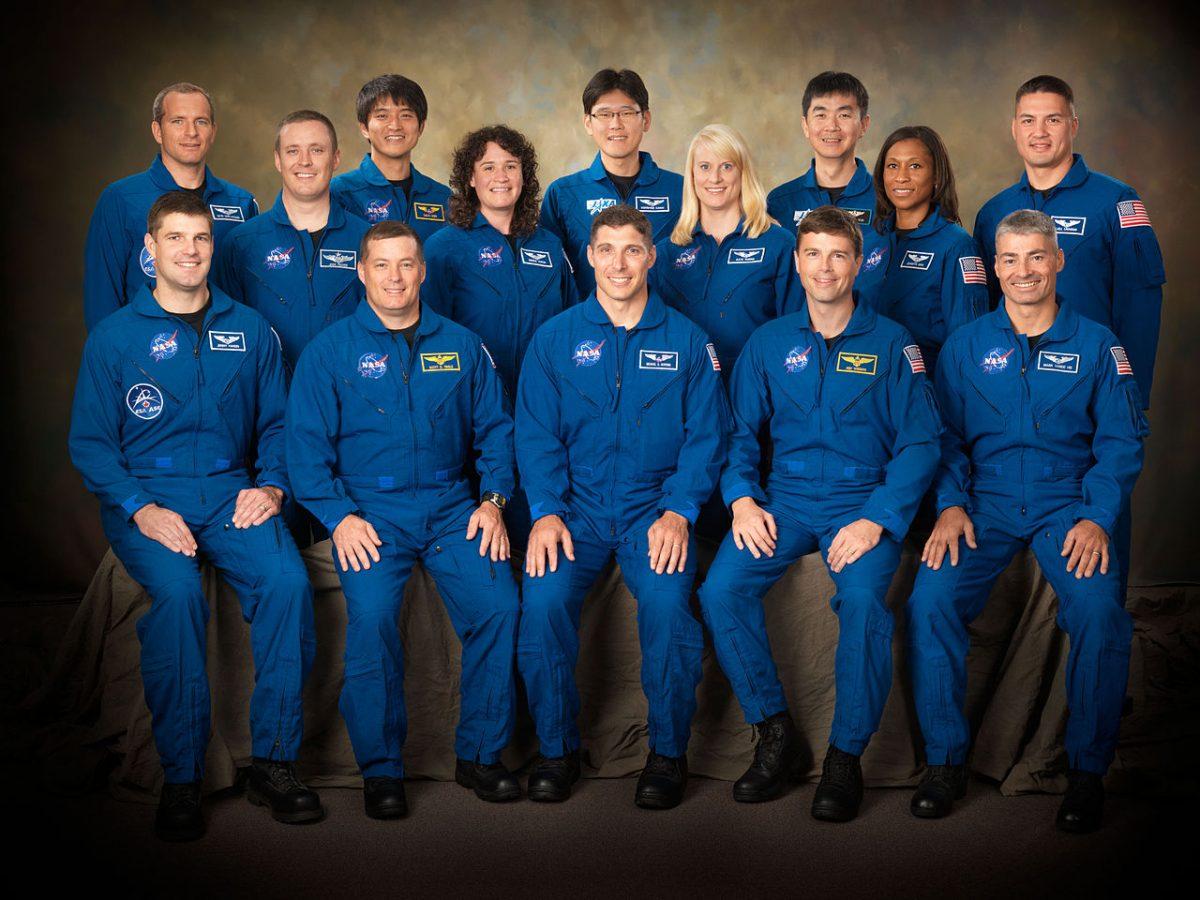 NASA astronaut class of 2009. 14 people - 9 Americans and 5 foreigners. 25% of students from classes 2004 and 2009 were military
NASA astronaut class of 2009. 14 people - 9 Americans and 5 foreigners. 25% of students from classes 2004 and 2009 were militaryIf you want to become a pilot of a spacecraft, go to the army. Theoretically, there are other ways to gain enough experience in piloting complex equipment, but from a practical point of view, you need to become a military pilot. If you want to fly a spacecraft, go to the Air Force and get as much experience as possible (flight hours) and control as much as possible the most advanced apparatus. This is the best way to become an astronaut since the days of the space program "
Mercury " and the foundation of NASA. And so it is.
 NASA astronaut and engineer Karen Nyberg on the ISS uses hazelnut to study his retina
NASA astronaut and engineer Karen Nyberg on the ISS uses hazelnut to study his retinaIf you want to follow the path of a scientist / engineer / doctor, you can. Now NASA receives 3 seats from every 6 seats aboard the ISS, one of which sometimes goes to a foreign partner. The only way to get to this place is to become a NASA astronaut. And the key to this is to perform the functions required of an astronaut, and usually they are weakly connected with the experience that you get outside of cosmonaut training. NASA instead looks at your accomplishments made within your profession, at your fitness. Every time NASA announces admission of candidates, the competition for each of the places reaches several thousand. The chance to get there is about 0.1%, and in reality you will have only three cycles (chances) for the period that you will be at the right age. There is a guide to maximizing your chances - there was Brian Shirou who tried to become an astronaut, but even he was eliminated at one of the stages. Cadie Coleman is a scientist and not an astrophysicist who got into space, and her instructions can also be read.
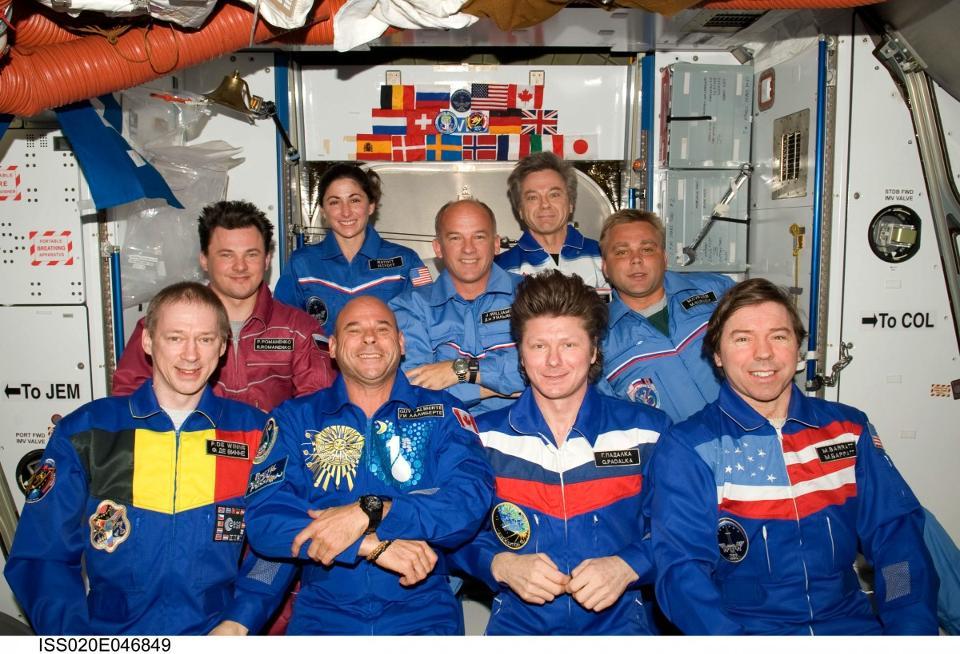 Guess who is the space tourist. Surprise - he is not in a red suit, he is in the first row, second from the left. This is Guy Laliberte , founder and CEO of Cirque du Soleil
Guess who is the space tourist. Surprise - he is not in a red suit, he is in the first row, second from the left. This is Guy Laliberte , founder and CEO of Cirque du SoleilAnd you can just become terribly rich. The second half of the seats belong to Russia, and they, unlike NASA, sell one of these places to anyone who can pay. You may not be a mission specialist, a payload, a commander or a pilot — you will be a space tourist. The only negative - “enough money” is estimated at $ 40,000,000. So, before the emergence of private commercial space flights, this is the only option.
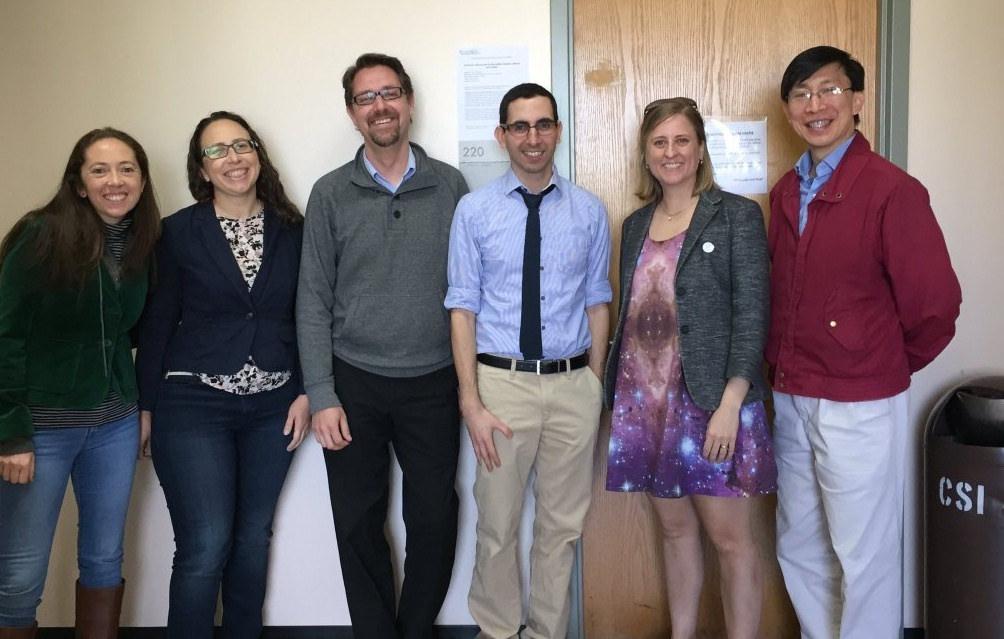 Graduate student at the City University of New York on doctoral defense
Graduate student at the City University of New York on doctoral defenseBut if you want to go the second way and become an astrophysicist? This, of course, is possible - with a large amount of hard work and with a small amount of luck. You need to go to college and specialize in physics, astronomy or aeronautics, and then graduate school and get a doctorate in astrophysics. Astrophysicists are four types: observers (collecting data from telescopes), instrumentalists (developing and creating telescopes, cameras, observatories, etc.), theorists (working on predicting and / or explaining the collected data), and data processing specialists (developing simulations and engaged in large-scale computer analysis). Many people specialize in one direction, but understand two or even three. I am a theorist who wrote and launched my own computer simulations and modified other people's simulations many times, and once I participated in a monitoring project. The work of astrophysics can be associated with frequent travels, with large volumes of manual work (especially for instrumentalists and sometimes for observers), with active communication with other people and with team work.
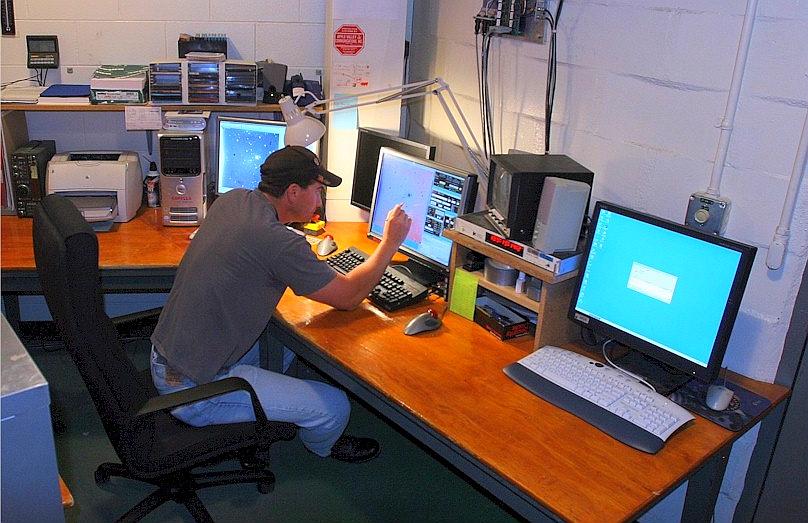 Data collection from telescopes is only one small part of the work carried out by the astrophysical community.
Data collection from telescopes is only one small part of the work carried out by the astrophysical community.Developing the skills of astronauts is not directly related to astrophysics, but if you want it, you can do it. And at any moment of your development, it is not the scores or the competition with classmates that are important - what matters is what you learn, what you achieve, and what you can demonstrate.
But as you get life experience and follow the path you have chosen, you can understand that this path is not to your liking. Many people start with the realization of their dreams, turn them into goals, but most of them discover that they do not bring them the desired pleasure. Perhaps there is something more interesting. Perhaps daily work is gnawing at your soul. Perhaps a big goal is not enough to justify your hard, monotonous work. Or, perhaps, in the case of an astronaut, you grow too big or gain too much weight (yes, for them there are limitations on physical parameters). I will not be able to help you cope with such a problem - I can only say that do not be afraid to meet the crisis. Do not be afraid to realize the fact that what you are doing may not be suitable for you, and you may have to step back and choose another direction in life.
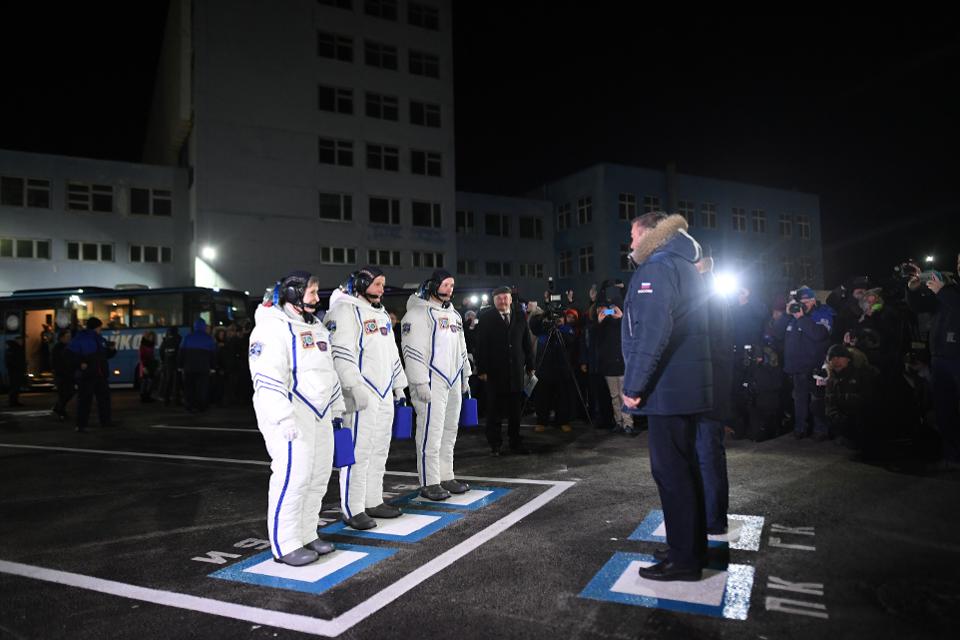 Astronauts Tom Peske , Oleg Novitsky and Peggy Whitson after checking spacesuits at the Baikonur cosmodrome before being sent to the ISS in November 2016.
Astronauts Tom Peske , Oleg Novitsky and Peggy Whitson after checking spacesuits at the Baikonur cosmodrome before being sent to the ISS in November 2016.You will meet people who say that you are a loser, if you have not realized your dreams - and I tell you, do not pay attention to them. Perhaps all the intermediate steps you like, and you want to continue to do this, as long as possible - then success to you. But if you find yourself unhappy, unsatisfied, and upset by the thought of returning to work that does not interest you - do not be afraid to step back and try something new. You should strive for a life that you like, but if the life you want to have is different from what you wanted to have before, don’t think that you have to stay on the same path if the journey has stopped bringing you pleasure. We are free to choose our adventures on the path of life, and to choose each next step. Indeed, according to the immortal words of
Frank Zappa (not an astronaut):
If your life turns out to be boring and miserable because you obeyed your mom, dad, teacher, priest, some dude from the TV, who told you how and what to do, then that’s what you need.
Note Perev .: by the way, in Russia the path to the space program is not much different. You can graduate from a higher educational institution with a technical specialty and get a job at RSC Energia. The queen . Having proved himself there, submit an application to a special commission, which is responsible for the training of astronauts. The second way is to get a higher education not related to the spacecraft device, but demanded in orbit. For example, now the most popular specialists are physicists and biologists. The third option is military aviation, a pilot.
By the way, Roscosmos announced recruitment to the cosmonaut corps. They will be prepared to fly to the moon. The competition is still underway and will last until the end of this year . Citizens of Russia not older than 35 years old with higher education can apply for a place in the cosmonaut corps. The priority is given to specialists with experience in the aviation and rocket and space industry. Candidates must also know English and be able to use a computer.Ethan Siegel - astrophysicist, popularizer of science, blog Starts With A Bang! He wrote the books Beyond The Galaxy , and Treknologiya: Star Trek Science [ Treknology ].